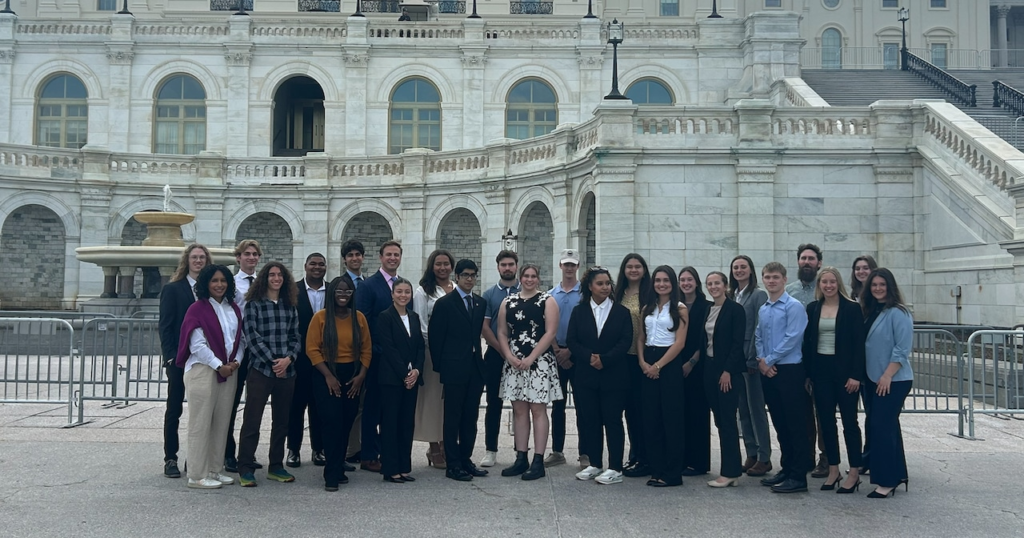Last month, Delaina McDaniel, a 19-year-old freshman from Worcester State University (WSU), traveled to Washington, D.C., to advocate for protecting higher education policies such as Pell Grants and the Federal Work-Study Program.
McDaniel’s mother is currently working three jobs and is doing her best to pay her daughter’s out-of-state tuition. It was through federal student aid that she was able to go to WSU for their public health program.
When she heard Republicans were considering making changes to Pell Grants that would affect their accessibility, McDaniel was infuriated.
“Most of our education is paid because of financial aid, Pell Grants, all that stuff,” McDaniel said. “I was freaking out. I had to sit back and be like, ‘Okay well now what do I have to do?’”
McDaniel, along with some of her WSU peers and students from six other Worcester colleges and universities, flew down to D.C. on April 30 on an organized trip to meet with the staff of Democrats and Republicans from several different states, including Texas, Alaska, New Jersey, Pennsylvania and Massachusetts.
The other colleges that sent students included Clark University, College of the Holy Cross, Quinsigamond Community College (QCC), Worcester Polytechnic Institute (WPI), UMass Chan Medical School and Nichols College, according to a Clark University spokesperson.
In their conversations with the staff members, the students urged them to keep higher education policies such as Pell Grants intact.
Pell Grants are a form of federal financial aid that is given to undergraduate students with exceptional financial need who have not earned a bachelor’s degree, according to the Federal Student Aid website.
On Thursday, May 22, the House of Representatives passed a tax and immigration bill that includes a provision where students have to be enrolled in at least 30 credit hours per academic year to earn a Pell Grant — an increase from the current 24 credits. The bill also eliminates federal subsidized loans for undergraduates and Direct Plus loans for graduate students beginning on July 1, 2026, according to Higher Ed Dive.
Isabella Corazzini of Quinsigamond Community College (QCC) is angry and worried about the passage of the bill.
“These are not just policy changes; they are betrayals. Let’s be real: it’s not our Massachusetts legislators holding us back. They’ve shown up, they’ve listened, and many have stood by students like us,” she told MassLive. “The real obstacles are legislators from other states — those who shut down these bills in the dark of night, who avoid their offices and refuse to meet with the very people their decisions are hurting.”
When the students spoke to the staff members, there was a sense of fear and worry that impacts to higher education could affect their experience in college.
Summit Smoker, a freshman at Clark University, met with the staff of representatives from Pennsylvania, his home state. He also met with staff from Sen. Dave McCormick, R-Penn., and Sen. John Fetterman, D-Penn.
The reception from each office was mixed, with staff from Rep. Lloyd Smucker’s office being receptive to Smoker’s concerns while Fetterman’s staff was more “wishy washy.”
In his communications, Smoker tried to articulate his worries about what cuts to federal student aid could mean to his college education.
“I’m asking myself, will I be able to finishing my degree?” said Smoker. “Will I have to drop out of college? I benefit from the Pell Grant. I benefit from federal subsidized loans and I am on work study as well.”
Now, that fear has turned to anger towards the Trump administration and members of Congress.
“I feel the current administration is not invested in the future of this country or democracy,” Clark University Student William Stafford said. “Education has taken me places I never knew possible, and without the multitude of aid I received from both my institution and the government, students such as myself wouldn’t be able to take advantage of the opportunities we work so hard for.”
With the House passing the bill with the changes to higher education, there needs to be greater advocacy, QCC Junior Alyssa Corazzini tells MassLive.
The House bill now heads to the Senate, who will be voting on the proposal next. Corazzini told MassLive that she hopes the Senate will “stand on the side of students and protects student aid.”
“Policymakers need to remember that working-class people require help to access higher education,” she said. “These aren’t just budget line items.”


